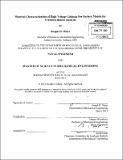Material characterization of high-voltage lithium-ion battery models for crashworthiness analysis
Author(s)
Meier, Joseph D. (Joseph David)
DownloadFull printable version (13.26Mb)
Other Contributors
Massachusetts Institute of Technology. Department of Mechanical Engineering.
Advisor
Tomasz Wierzbicki.
Terms of use
Metadata
Show full item recordAbstract
A three-phased study of the material properties and post-impact behavior of prismatic pouch lithium-ion battery cells was conducted to refine computational finite element models and explore the mechanisms of thermal runaway caused by internal short circuit. In phase one, medium and large sized cells at low state of charge (SOC) were impacted or compressed while measuring punch load, displacement, cell voltage, and surface temperature until an internal short circuit was detected, followed by a rise in surface temperature. Results were used to either refine the constitutive cell properties or validate finite element models. In phase two, an exploratory study into the behavior of lithium-ion prismatic pouch battery cells following surface impacts with hemispherical and conical punches (abuse testing) was conducted for the purpose of observing pouch behavior and adequacy of parameter measurement methods. Cells were impacted by steel punches to loads as high as 500 kN while recording punch load, displacement, and pouch surface temperatures, as well as normal and high-speed video footage. Comparisons of load, surface temperature, and thermal runaway for various states of charge and punch types are presented. In the third and final phase of the study, material characterization of cell components was conducted to further refine computational models and draw conclusions regarding the interactions between impacted cell layers and the physical cause of internal short circuits. Results of uniaxial tension tests for coated and uncoated anode and cathode layers, as well as separator layers are presented, as well as conclusions about the use of digital image correlation (DIC) software in such studies. Much of the data generated was used to further refine and validate prismatic pouch lithium-ion battery cell computational models developed by the MIT Impact and Crashworthiness Laboratory. Physical tests conducted in phase one of this study were compared to model simulations, which showed that the models make close approximations for material displacement, and are good predictors of internal short circuit.
Description
Thesis (Nav. E. and S.M.)--Massachusetts Institute of Technology, Dept. of Mechanical Engineering, 2013. Cataloged from PDF version of thesis. Includes bibliographical references (p. 59-60).
Date issued
2013Department
Massachusetts Institute of Technology. Department of Mechanical EngineeringPublisher
Massachusetts Institute of Technology
Keywords
Mechanical Engineering.